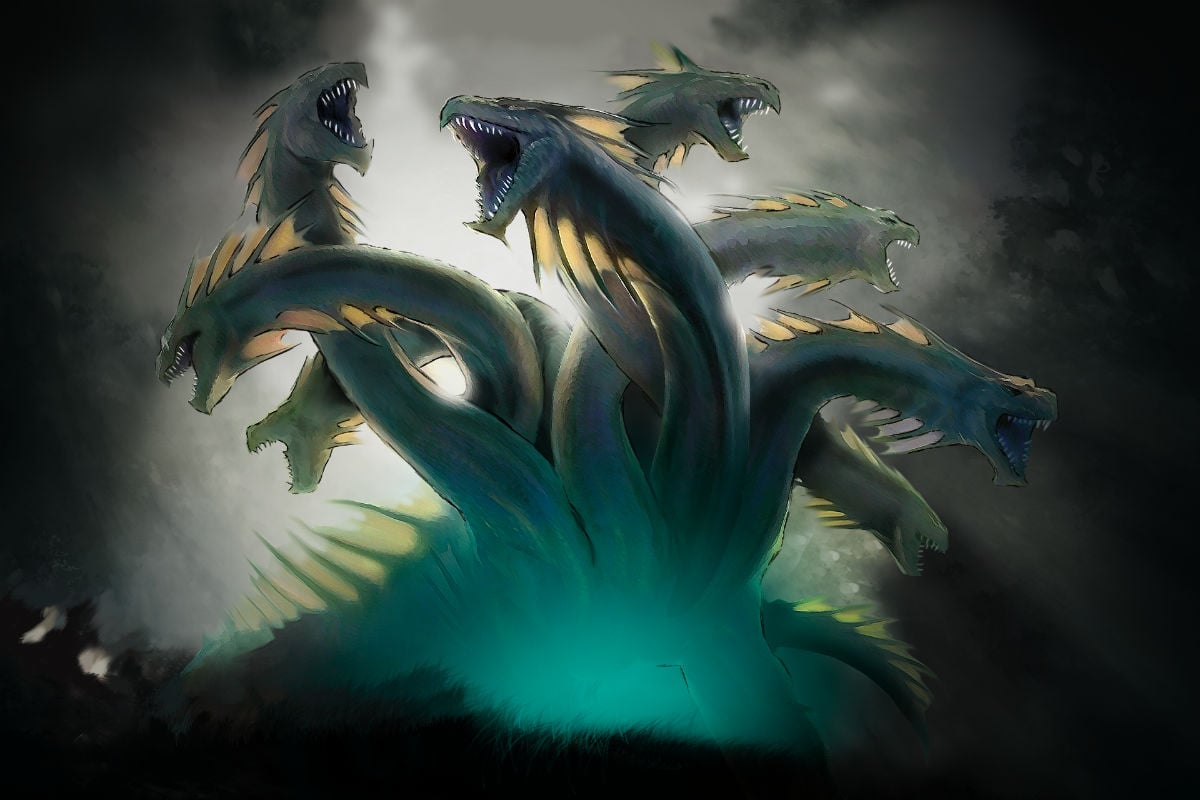
How to handle the many-headed hydra of sales technology
In ancient days, there was a great sea serpent with sharp teeth, poisonous breath, and many heads. It was called the hydra, and it terrorized all who came near.
Many heroes attempted to defeat the hydra, but instead ended up at the bottom of the sea. For, every time one struck off one head of the hydra, two new heads would grow instantly in its place to continue the battle.
Against such a foe, none could survive for long.
Though this story is a few thousand years old, anyone who has wrestled with sales technology can identify with it.
You purchase sales technology, such as a CRM, to solve a particular problem in your organization, only to discover it requires customization in order to function the way you need it to. When the customization is complete, you discover that the changes have caused new problems.
While the technology team wrestles with those problems, a plugin is purchased to solve a different problem, and the plugin causes something else to break. Every time you cut off the head of one problem, new problems grow instantly in their place.
And if you attempt to add new technologies and integrate them into your “tech stack”? Your hydra springs a whole new set of poison-breathing heads for you to battle.
That poison breath is killing your sales effectiveness and sending perfectly good opportunities to the bottom of the sea.
It’s also destroying your technology ROI.
How a major retailer fought the hydra and lost
I’ve written elsewhere about a failed SAP integration undertaken by the major grocery chain, Lidl. In this story, the organization invested $500 million in a technology integration that they eventually abandoned.
As the media tells the tale, the project started out well but quickly grew more and more complex. As new functions and additional stores were added to the implementation, new problems cropped up. And for every solution there were more problems and…
$500 million later, the hydra won and Lidl’s major technology upgrade disappeared, drowned under an ocean of complexity.
Some technology companies like it this way
Most technology companies pride themselves, publicly, on their ability to simplify your business.
But privately, in back rooms, these companies are making a killing on complexity.
They trick you into thinking they’ll help you fight the hydra, but after you implement them… you find out they ARE the hydra.
You buy inexpensive “starter seats” with Salesforce, for instance, thinking it’ll help your sales team get a handle on the increasing complexity of managing their pipeline. Salesforce promises to provide you with a complete ecosystem that gives you every function you could ever want and more, all integrated into a single, fluid, seamless system.
Yet after you implement, after expensive "customizations", you discover there are additional plugins you’ll need in order to get it to do the things you expect it to do. But, in order to do that, you first need to upgrade to the Enterprise tier. Oops.
And once you add those plugins, you discover they create problems with the core functions, so you need custom coding to fix those problems.
And for every problem you fix…
Two new poison-breathing heads grow in its place.
And each new head represents new profit opportunities for Salesforce...
You can’t defeat the hydra by battling on its own terms
In the ancient Greek myth, a great hero came to rescue. Heracles, the demi-god, succeeded on his second attempt at defeating the hydra by changing the terms. Instead of battling each new head separately as it arose, he cauterized each head as he severed it, using the serpent’s own venom.
It was a brilliant and effective solution.
But what if Heracles had never had to fight at all? What if “defeating” the hydra were as simple as… grabbing a lifeline and floating away?
In sales organizations, it really can be this simple. You don’t need a hero to fight the serpent and save you from technology complexity. You just need to stop fighting the hydra. Leave that sea of complexity and its many-headed monster to your competitors.
I don’t mean that you should stop using technology. Going back to the days of a manual Rolodex won’t rescue you.
What I am suggesting is that you stop wrestling with the big technology giants that want you to have more problems for them to solve with your dollars.
I created Membrain to be a lifeline for organizations like yours. I want you to be able to sail away from the chaos of battling hydras, and get your team to serene, blue-skied seas where they can focus on their jobs instead of wrestling with the monster of technology complexity.
I designed Membrain from the start to be an easy-to-use tool that solves all of a b2b sales team’s major problems in a straightforward, flexible manner.
- It eliminates the complexity of custom coding, plugin bonanza, and escalating implementation costs,
- Provides functionality that enables the team to substantially improve performance on an ongoing basis, by focusing HOW to sell,
- And does so with one beautiful, easy-to-use workflow that your salespeople and managers will love engaging with.
Because b2b sales effectiveness is built into the core of the software, Membrain doesn’t require complex add-ons or custom coding in order to function effectively within your unique sales environment.
Work with us to calculate the ROI of improved sales effectiveness, then use our fun, easy-to-use pricing calculator for a transparent look at the cost of our products, and reach out to discuss how to get started.
I would love the opportunity to throw you our lifeline and enable you to sail away to better profits and more sales.
Still curious? Take a look at the side-by-side comparision of Membrain vs other CRM.

By George Brontén
George is the founder & CEO of Membrain, the Sales Enablement CRM that makes it easy to execute your sales strategy. A life-long entrepreneur with 20 years of experience in the software space and a passion for sales and marketing. With the life motto "Don't settle for mainstream", he is always looking for new ways to achieve improved business results using innovative software, skills, and processes. George is also the author of the book Stop Killing Deals and the host of the Stop Killing Deals webinar and podcast series.
Find out more about George Brontén on LinkedIn








